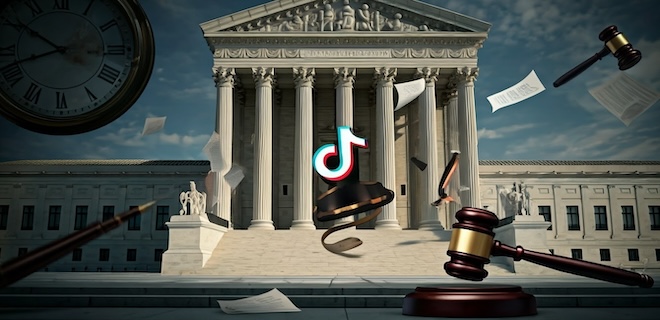 |
|||||||||||
|
|||||||||||
| Supreme Court Hears Oral Arguments on TikTok Ban |
 |
The Supreme Court heard oral arguments on the legality of the TikTok ban on Friday, January 10th. Plaintiffs claim that the ban will have far-reaching implications for free speech, as it will be the first time in U.S. history that the government has outlawed an entire communication platform. For the 170 million Americans who use and earn income on the platform, its ban will be nothing short of devastating. And many wonder if it sets a precedent for other platform bans for various political reasons. Tech observers are quick to point out the irony. As the U.S. criticizes other nations for restricting social media access, it's poised to become the first major democracy to impose such sweeping platform restrictions. This raises uncomfortable questions: What's to stop other countries from forcing U.S. tech giants like Facebook or Google to sell to local entities or face similar bans? Some are warning that the outcome of this case could redefine how governments worldwide address privacy and security threats posed by foreign-owned digital platforms. For U.S. tech companies operating globally, this might be a case of throwing stones while living in a glass house. – SS |
 |
| Narrowing Options for Safety-Conscious Marketers |
According to Dentsu, half of businesses plan to invest more in social ads in 2025, but will they be able to? Social media advertising remains crucial for US brands, with spending hitting $76.4 billion in 2024. But that 5.6% growth from 2023 marks the slowest increase ever — a far cry from 2017's 31% surge. The slowdown may be inevitable as brand-safety concerns shrink the reliable options for marketers. Take X, where advertiser confidence continues to tank. Kantar reports that 26% of marketers plan to cut X spending in 2025, which is the biggest pullback ever seen from a major global ad platform. Only 4% of marketers think X ads are "brand safe," compared to 39% for Google. Overall, trust in X's ads has dropped from 22% to 12% since 2022. TikTok was a great alternative, and ad spend reached nearly $ billion in 2024 — up 25% from 2023. But the platform's future hangs in the balance with a potential ban under Supreme Court review. Now Meta's throwing another curveball: Zuckerberg announced they're dropping fact-checking on Instagram and Facebook. That's raising red flags about brand safety on platforms that grabbed a huge piece of social media ad dollars in 2024. How will this announcement affect advertiser confidence? While advertisers have been largely silent as of this writing, we shouldn’t be surprised to see a greater portion of the marketer’s budget go toward retail media. Will Zuckerberg mind the loss of ad revenue? Some say that the savings that Meta gains from eliminating the third-party fact checkers is the true driver behind the move. – SS |
| Trump’s FTC Pick Ferguson Signals End of New Privacy Rules |
| Andrew Ferguson, President-elect Trump's pick to head the FTC, signals a significant shift in how the commission will approach privacy and tech regulation. While he says he’ll continue to apply pressure on Big Tech, his focus will differ from that of the current commission. Ferguson says his priority will be on enforcing existing privacy laws rather than creating new ones. He's likely to end the FTC's 2022 commercial surveillance rulemaking effort, stating in a recent dissent that, "The Commission under President Trump will focus primarily on our traditional role as a cop on the beat. We will vigorously and faithfully enforce the laws that Congress has passed, rather than writing them." This shift may explain Meta's recent decision to end fact-checking, which could signal broader changes in how platforms self-regulate. For ad tech companies adapting their data practice to the 2022 rulemaking, Ferguson's suggests less new regulation but continued scrutiny under existing privacy laws. The change in enforcement priorities could reshape how digital advertising handles data collection and targeting. Companies that have been preparing for new FTC privacy rules may need to refocus on compliance with current regulations instead. – SS |
| @{optoutfooterhtml}@ |








